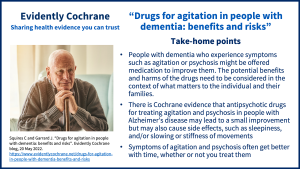In this blog for the families of people with dementia, doctors Charlotte Squires and James Garrard talk about drugs used to treat symptoms of agitation and psychosis in people with diagnosed dementia. They reflect on what doctors and families together might want to consider when making decisions about trying these treatments.
Take-home points

A diagnosis of dementia for both the person and their families can feel a bit like a trip into the unknown with a lot of questions – not just about the ‘here and now’, but also about how the future might look, and what changes might arise, and what might be done about them.
For many people with dementia, as their illness progresses, they may experience worsening memory, and increasingly struggle to understand the world around them and how to safely look after themselves.
For some people with dementia, they may also experience symptoms causing stress or distress, including agitation and psychosis. This could include changes to their behaviour, unusual thoughts (delusions) or seeing or hearing things that are not there (hallucinations). Understanding these symptoms and the potential harms they may cause is extremely important, as is appreciating the risks and benefits of medications aiming to treat them.
Agitation and psychosis might be distressing both for the person experiencing them, but also their family and carers, and may also influence other factors such as the care someone requires, and where it needs to happen. In some cases, these symptoms may mean it becomes impossible for them to remain at home, if they need specialist support in care facilities.
If you are supporting someone with dementia who is experiencing these symptoms, and who has been offered medication to help, you might be interested in what the benefits and risks might look like from research studies.
The evidence on drugs for agitation in people with dementia
A Cochrane Review Antipsychotics for agitation and psychosis in people with Alzheimer’s disease and vascular dementia (published December 2021) looked at the evidence for typical and atypical antipsychotic drugs for people with Alzheimer’s dementia or vascular dementia experiencing agitation or psychosis.
The classes ‘typical’ and ‘atypical’ refer to how the medications work at a chemical level in the brain. Examples of ‘typical’ antipsychotics would be haloperidol or thiothexene. Examples of ‘atypical’ antipsychotics include olanzapine, risperidone, quetiapine or aripiprazole.
What did the review find?
This review gives us some information that can help with decisions about whether to try these two classes of medications. Overall, it suggests that using these antipsychotics may lead to a small improvement in symptoms. It is unlikely however that most people will experience a big improvement, and they also may experience side effects.
The results suggest that people who receive typical antipsychotics compared with placebo:
- may experience slightly improved symptoms of psychosis, but the effect on agitation is uncertain
- probably have a higher risk of being drowsy and are more likely to experience movement disorders (such as slowing of movements, or stiffness)
- may have a slightly increased risk of serious harm and death
The results suggest that people who receive atypical antipsychotics compared with placebo:
- probably experience slightly reduced symptoms of agitation
- probably experience no important difference to symptoms of psychosis
- have a higher risk of being drowsy and are probably more likely to experience movement disorders
- probably have a slightly increased risk of serious harm and death
Is it worth it? What happens to people who don’t try these medications?
The review authors also noted that some people in the studies who did not take antipsychotic drugs also sometimes had an improvement in their symptoms. This probably reflects the natural variations in these symptoms over time, regardless of medication changes. For many patients, tablets are often only one part of the puzzle. There might be other aspects to consider in order to help manage symptoms. Such as access to specialist assessment and support (including carer support), or environmental aspects that may unsettle someone, such as a recent change to living arrangements, a recent hospital admission, or changes to their physical health, including new pain, or other issues.
Symptoms versus drug side effects: what matters and to whom?
It may be helpful to consider who is distressed by the symptoms. As a family member, it may be harder to witness these symptoms in a loved one, than it is for your loved one experiencing them. This is particularly relevant in cases where the benefit of drug treatment might be small.
It may also be helpful to consider the impact of side effects, such as sleepiness. For example, your loved one may be more likely to sleep through your visit, and missing that could be upsetting, particularly if opportunities for visiting are limited. On the other hand, if the symptoms are very severe and/or causing risk to the person, sleepiness may be an intended or acceptable outcome. This is normally only the case for a small number of people and should be openly discussed with relevant next of kin.
Weighing it up: What are the options? What should we ask?
There can be a balance to be made when considering the impact of symptoms, but also the potential side effects of treatments for those symptoms, and it might be worth discussing them with the healthcare professional involved in the person’s care:
- Are the symptoms distressing? For whom? What are the likely effects of the symptoms? For example, might the symptoms mean the person may have to go into residential care if they can no longer be supported at home?
- What improvement are we hoping to see, and over how long?
- Would the potential drug side effects be distressing or problematic? For whom?
- Could some side effects actually be beneficial, or be an intended effect? (For example, sleepiness, if distress is severe)
- Is ‘waiting and seeing’ an option at this time? What might change the current approach or recommendation?
What other resources might help with these decisions?
- Sources of help aside from your healthcare team include the Admiral Nurse Dementia Helpline. You can call 0800 888 6678 or email helpline@dementiauk.org to speak to a dementia specialist Admiral Nurse
- ‘The book about getting older’ by Lucy Pollock also has some excellent information about shared decision making. You can also watch Lucy Pollock speak in these recordings from Age UK
Reference:
Mühlbauer V, Möhler R, Dichter MN, Zuidema SU, Köpke S, Luijendijk HJ. Antipsychotics for agitation and psychosis in people with Alzheimer’s disease and vascular dementia. Cochrane Database of Systematic Reviews 2021, Issue 12. Art. No.: CD013304. DOI: 10.1002/14651858.CD013304.pub2. Accessed 17 May 2022.
Read more of our dementia blogs.
Join in the conversation on Twitter with @charsquires @jamie_garr @CochraneUK and @CochraneDCIG or leave a comment on the blog.
Please note, we cannot give specific medical advice and do not publish comments that link to individual pages requesting donations or to commercial sites, or appear to endorse commercial products. We welcome diverse views and encourage discussion but we ask that comments are respectful and reserve the right to not publish any we consider offensive. Cochrane UK does not fact check – or endorse – readers’ comments, including any treatments mentioned
Charlotte and James have nothing to disclose.
Read James’ biography. Charlotte’s appears below.


